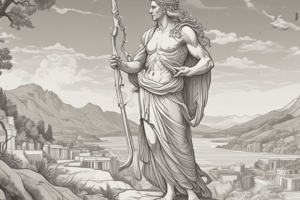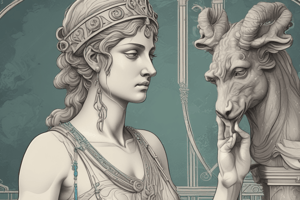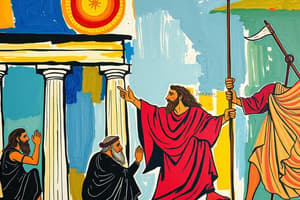Podcast
Questions and Answers
What is classical mythology?
What is classical mythology?
- The study of myths from ancient Greece and Rome as they are used or transformed by cultural reception (correct)
- The study of myths from various cultures throughout history
- The study of myths from ancient Greece and Rome as they were originally told
- The study of myths from ancient Greece only
What are the major survivals of classical antiquity throughout later Western culture?
What are the major survivals of classical antiquity throughout later Western culture?
- Philosophy, religion, and mythology
- Art, literature, and mythology
- Science, philosophy, and mythology
- Philosophy, political thought, and mythology (correct)
When did the myths enter the literate era?
When did the myths enter the literate era?
- Around 500 BC
- Around 100 AD
- Around 300 BC
- Around 700 BC (correct)
What are mythography and mythographers?
What are mythography and mythographers?
What were Greek myths often concerned with?
What were Greek myths often concerned with?
What are Roman myths?
What are Roman myths?
What did the Romans do with Greek myths?
What did the Romans do with Greek myths?
What was the literary collection of Greco-Roman myths with the greatest influence on later Western culture?
What was the literary collection of Greco-Roman myths with the greatest influence on later Western culture?
What did Rome take over and adapt from Greek culture?
What did Rome take over and adapt from Greek culture?
Flashcards
Classical Mythology
Classical Mythology
The study of myths from ancient Greeks and Romans, and their cultural reception.
Greek Myths
Greek Myths
Narratives related to ancient Greek religion, often about gods, supernatural beings, and heroes.
Roman Myths
Roman Myths
Traditional stories about ancient Rome's origins, religious institutions, and moral examples, with a sense of divinely ordered events.
Interpretatio Graeca
Interpretatio Graeca
Signup and view all the flashcards
Mythography
Mythography
Signup and view all the flashcards
Famous Roman Myth
Famous Roman Myth
Signup and view all the flashcards
Metamorphoses
Metamorphoses
Signup and view all the flashcards
Study Notes
Study of Myths of the Greeks and Romans
- Classical mythology is the study of myths from ancient Greeks and ancient Romans as they are used or transformed by cultural reception.
- Along with philosophy and political thought, mythology represents one of the major survivals of classical antiquity throughout later Western culture.
- The myths are believed to have been acquired first by oral tradition, entering since Homer and Hesiod (c. 700 BC) the literate era.
- Later works by those who studied or collected the myths, or sometimes all literary works relating to mythology, are known as mythography and those who wrote them as mythographers.
- Greek myths were narratives related to ancient Greek religion, often concerned with the actions of gods and other supernatural beings and of heroes who transcend human bounds.
- Roman myths are traditional stories pertaining to ancient Rome's legendary origins, religious institutions, and moral models, with a focus on human actors and only occasional intervention from deities but a pervasive sense of divinely ordered destiny.
- The Romans identified their own gods with those of the Greeks, keeping their own Roman names but adopting the Greek stories told about them (see interpretatio graeca) and importing other myths for which they had no counterpart.
- The most famous Roman myth may be the birth of Romulus and Remus and the founding of the city, in which fratricide can be taken as expressing the long history of political division in the Roman Republic.
- The literary collection of Greco-Roman myths with the greatest influence on later Western culture was the Metamorphoses of the Augustan poet Ovid.
- Mythology was not the only borrowing that the Romans made from Greek culture. Rome took over and adapted many categories of Greek culture: philosophy, rhetoric, history, epic, tragedy and their forms of art.
- Some scholars argue that the reason for this “borrowing” is largely due to the chronology of the two cultures.
- Many myths of Graeco-Roman antiquity show "a nucleus" that appears in "some later common European folk-tale".
Studying That Suits You
Use AI to generate personalized quizzes and flashcards to suit your learning preferences.




